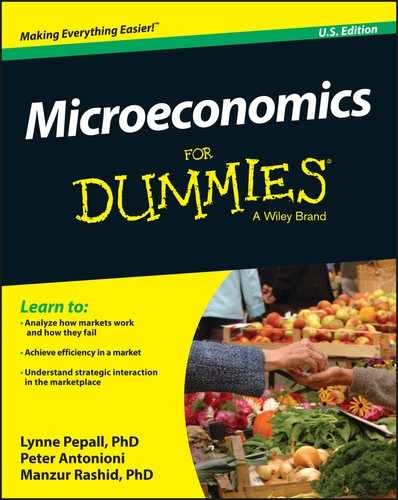About the Author
Lynne Pepall is professor of economics at Tufts University in Medford, Massachusetts. Professor Pepall received her undergraduate degree in mathematics and economics from Trinity College, University of Toronto, and her PhD in economics from the University of Cambridge in England. She has written numerous papers in microeconomics and in industrial organization, appearing in The Journal of Finance, The Journal of Industrial Economics, Economic Journal, Economica, and other publications. She has taught industrial organization and microeconomics, with enthusiasm, at both the graduate and undergraduate levels, and is the co-author of a leading undergraduate textbook in industrial organization, Industrial Organization: Contemporary Theory and Empirical Applications, also published by Wiley. From 2007–2013 Professor Pepall served as Dean of the Graduate School of Arts and Sciences at Tufts University. She was a Visiting Economist in the Economic Analysis Group of the Antitrust Division, U.S. Department of Justice in 2013–2014. She lives in Newton, Massachusetts with her husband, sometimes one or two sons, and a lively golden retriever called Nelson.
Peter Antonioni is a senior teaching fellow in the Department of Management Science and Innovation at University College London, where he teaches strategy. His research interests are in the economic history of music production. If not working, he can usually be found crying over Tottenham Hotspurs’ most recent performance or putting his angst into playing blues guitar.
Manzur Rashid read economics at Trinity College, Cambridge, where he graduated with a double first and was elected to junior, senior, and research scholarships. He completed his doctoral studies in economic theory at UCL, where he specialized in game theory, bounded rationality, and industrial organization, under the supervision of Martin Cripps. Manzur has taught economics at UCL, Cambridge University, New College of the Humanities, and Charterhouse.
Dedications
Lynne: To my partner in life and in economics, Dan, my sons Ben and Will, and my golden Nelson.
Peter: To Tanya, Mum, Dad, Paul, and Jen, who suffered most from me writing this.
Manzur: For Ilyas.
Author’s Acknowledgments
Lynne: Thank you to Tufts University and my colleagues in economics for their academic inspirations and to the wonderful people at Wiley, Tracy Boggier and Corbin Collins, for their commitment and support. It takes a village!
Peter: With many thanks to the support of my colleagues at UCL, and to the many economists who once had to explain patiently all this material to me.
Manzur: I am grateful to all the people at Wiley — including Mike Baker, Simon Bell, Steve Edwards, Andy Finch, Annie Knight, and Kate O’Leary — who helped us to get this book into shape. I am also grateful to Ron Smith for his helpful suggestions and comments. Thanks to my friends and family for their endless support. Finally, thank you to my teachers: Martin Cripps, Hamish Low, Rupert Gatti, Steve Satchell, Gernot Doppelhofer, and Kevin Sheedy.
Publisher’s Acknowledgments
Acquisitions Editor: Tracy Boggier
Editor: Corbin Collins
Project Coordinator: Kinson Raja
Cover Image: © SusaZoom/Shutterstock, Westend61/Getty Images, Inc.
